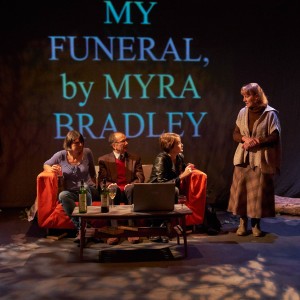
Left to Right: Sophie Buckley, John Lister, Claire Morley and Beryl Nairn in Colder Than Here, photograph by Michael J Oakes
The audience enters Friargate’s long, narrow black box space through a suggestion of an ivy-prickled iron gate, framed with log benches and autumn leaves. Taut classical piano plays as they take their seats before soft, cool light illuminates a live violinist behind a muslin gauze stretching the length of the space. A wintry circle shows skinny tree branches reaching upstage. Through Louise Larkinson’s unintrusive, nurturing direction we are introduced to the unreachable, the beyond, just a breath before the corporeal; a subtle shift of perspective.
“D’you ever get days where just breathing too deeply makes you cry?”
Wife and mother Myra (brought to softly-urging life by Beryl Nairn) is “off work wi’ dying” and needs things to do. But then, so do her family, if they are to survive her unsentimental clutching for control in her last weeks and months before she “shuffles off”. Bodies and boilers refuse to work as they damn well should. Terminal bone cancer aches coldly through all four of Wade’s poetic, acutely observed characters in the Bradley family. Myra is determined to die on her own terms while her husband Alec (John Lister) is determined to ignore her death out of fact. Their two daughters, Harri (Sophie Buckley) and Jenna (Claire Morley) shiver through increasing layers of woollens and Myra’s detached micromanagement of her own funeral.
“It’s these places, they give me a death wish.”
Woodland burial plots are inspected in turn like new apartments, Jenna accompanying her mother’s visits while she is not required anywhere else, until Myra gradually calls off from these, leaving Jenna to re-form connections with her father and sister that she will need once Myra is gone. Delicate black humour laces cardboard coffins and powerpoint presentations, as the Bradleys prepare for the inevitable. Negotiating new routines and new boundaries, together they move to re-evaluate what emotional labour they can manage. They are all “stealth cleaning” in their own way. They make peace with death, and each other, while keeping an arm’s length.
Most poignant is Myra’s emotional connection to her green funeral. Set in 2005, twelve years after the first UK-based natural burial, the play explores how one who knows their fate might attempt to greet it and make it their own, to mother it in the knowledge that it has and will again mother us. Myra’s hand-painted flat-pack coffin evolves into a kindly effigy of Starry Night, and when she eases herself to the ground at the end of the play, she looks upward with gratitude and reaches for the stars with twinkling fingers.
Catch the show at Friargate Theatre until this Sunday. Tickets available here.



